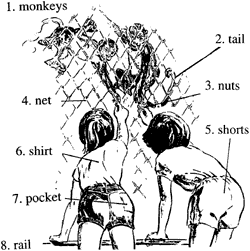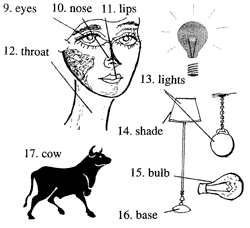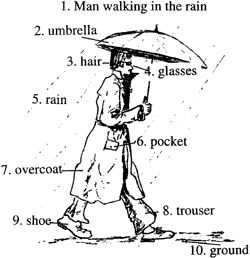Unit 14: Relative Pronouns
Pictured Words

| 1. monkeys
|
| 2. tail
|
| 3. nuts
|
| 4. net
|
| 5. shorts
|
| 6. shirt
|
| 7. pocket
|
| 8. rail
|

| 9. eyes
|
| 10. nose
|
| 11. lips
|
| 12. throat
|
| 13. lights
|
| 14. shade
|
| 15. bulb
|
| 16. base
|
| 17. cow
|
New Words
Nouns
Adjectives
Sayings
With whom are the boy and girl playing?
Whose nuts seem better to the children?
Why should they do this to them?
Who is lovely?
We take pleasure in those whose eyes are full and round.
Turn the light on, please.
What will make the room bright?
Whoever does it will seem strange.
Relative Pronouns
In this story we see some examples of these pronouns:
Who is greatest in the kingdom of heaven?
whoever then will make himself as low as this little child
whoever is a cause of trouble to one of these little ones
who have faith in me
There other relative pronouns like "who" and "they" may best be put in a Table:
Relative Pronouns can be singular or plural
| WHO
| form for subject - "persons"
|
| WHO(M)*
| form for object
|
| WHOSE
| form for possessive adjective
|
| WHICH
| form for subject or object - "things"
|
| WHAT
| form for subject or object - "that which"
|
*whom is not usual in talking and writing.
These words take the place of a noun or pronoun that has already been said and so they are called relative pronouns: they relate to those other "things".
They are used in a statement to give extra knowledge of what is talked about in it.
A relative pronoun may be the subject or the object of the statement, but it always comes at its start.
"Who" is used for persons and "which" is used for animals or things.
They may be either singular or plural.
If the statement does not need to say something about a previous noun or pronoun, "who" or "which" may have the words "this" or "those" before them:
those who go to her do not come back again
those who have given me their love are loved by me
those who had taken us prisoner made request for a song
those who had taken away all that we had gave us orders
If these statements had been for one person "this" would have been used in place of "those".
The possessive adjective "whose", may be used for both persons and things.
Like the other relative forms it is put before the statement and the noun it is referring to comes after it, whether that noun is the subject or the object:
those whose words are false
those whose acts are false
he whose heart is glad has an unending feast .
he whose ways are upright will go safely.
those whose acts are true are his delight
The other word in our Table is "what".
It has the sense of "that which":
I will say what I have.
who is able to keep from saying what is in his mind?
I will not say what is false to your face.
"What" may also be used when a question is asked:
what am I to give you?
what is the upright man to do?
what is man?
what is it to him?
what were all those herds which I saw on the way?

| 1. man walking in the rain
|
| 2. umbrella
|
| 3. hair
|
| 4. glasses
|
| 5. rain
|
| 6. pocket
|
| 7. overcoat
|
| 8. trousers
|
| 9. shoe
|
| 10. ground
|
A Great Rain
Then Elijah said to Ahab, Up!
take food and drink;
for there is a sound of much rain.
So Ahab went up to have food and drink, while Elijah went up to the top of Carmel;
and he went down on the earth, putting his face between his knees.
And he said to his servant, Go now, and take a look in the direction of the sea.
And he went up, and after looking said, There is nothing.
And he said, Go again seven times;
and he went seven times.
And the seventh time he said, I see a cloud coming up out of the sea, as small as a man's hand.
Then he said, Go up and say to Ahab, Get your carriage ready and go down or the rain will keep you back.
And after a very little time, the heaven became black with clouds and wind, and there was a great rain.
And Ahab went in his carriage to Jezreel.
And the hand of the Lord was on Elijah;
and he made himself strong, and went running before Ahab till they came to Jezreel.
Additional Reading
In the country where Elijah was living the weather is of special interest.
It is quite common to have rain clouds go across the whole sky in a very short time.
They seem to come up from the sea as a little bit of cloud which is of no size at all in that great stretch of blue sky.
But it becomes rain in a very short time.
It seems only a few minutes.
People who are living under those weather conditions will make for some kind of cover so soon as they see such a cloud starting to come into the sky.
This is the sort of weather that is named Mediterranean by the experts.
But do not put that word in your memory just yet.
The point about this story is that there had been no rain for more than three years.
It seems strange to us that Elijah knew when it would rain.
He went up to the top of the mountain above the sea to get ready for the coming of the rain, and he sent word to Ahab.
He even sent his servant to keep watch for its coming.
He was told by God that this rain would come.
It put Elijah in a very important position in his relation with Ahab to be able to say to him, before it came about, that the rain would come and be so destructive that he would need to get away to a safe place.
And this is what Ahab did.
There are many pictures of the prophet Elijah running before Ahab's carriage through the driving rain, with his hair flying behind him and the light of purpose on his face.
He got his full measure of effect on Ahab and sent him the word that God was in control of all his designs.
Helpful Notes
| keep watch
| having one's eyes open.
|
| knees
| part of the legs of the body.
|
| relation
| in hand with.
|
| carriage
| a thing for taking a ride.
|
| picture
| a story without talking.
|
| clouds
| soft bodies in the sky above us.
|
| mountain
| a very high place.
|